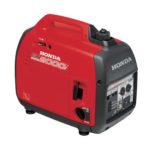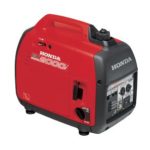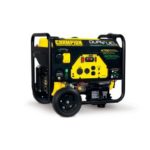When you are camping or outdoors, having a propane generator is handy to have around. You can use it to power your cooking appliances, and your refrigerator and recharge your cell phones and laptop computers.
A propane generator is a lifesaver during a natural disaster when the gas pumps aren’t running or available.
1. Are Propane Generators Better Than Gas Generators?
Propane generators are beneficial when you consider fuel and maintenance costs. For the environment, propane generators do not have the carbon build-up and deposits common in a gasoline system. Propane is a cleaner building fuel than gasoline.
As indicated in the table by the U.S. Energy Information Administration, carbon dioxide emissions are more for gasoline than propane.
| Fuel Type | Pounds of CO2 emitted per million BTU |
|---|---|
| Coal (anthracite) | 228.6 |
| Gasoline (without ethanol) | 157.2 |
| Propane | 139.0 |
| Natural gas | 117.0 |
2. How Much Propane Does a Propane Generator Use?
Propane-powered generators boast surging popularity thanks to how eco-friendly they are. You can install these generators either below or above the ground. Their capacity is often between 500 and 1000 gallons, and they burn approximately 2 to 3 gallons an hour.
However, each tank is usually 80% full. Therefore, a 500-gallon tank can power your home for about 134 to 200 hours.
3. How Long Will a 5-Gallon Propane Tank Run a Generator?
The time a 5-gallon propane tank runs a generator depends on your use. These propane generators consume between 2 and 3 gallons of propane an hour. In this case, 5 gallons will last approximately two and a half hours, depending on your usage.
4. How Long Will 20 lb Propane Tank Run a Generator?
Undoubtedly, 20-pound tanks are the most popular option in residential properties. Understanding how long they can run a generator helps property owners make logical decisions.
First, it would be best to convert this figure into gallons. Typically, a full 20-lb tank of propane is about 4.73 gallons. With this, you can be sure of up to 432,804 BTU. A typical generator consumes around 50,000 BTU an hour, meaning this tank will last approximately 8.8 hours.
5. How Long Will 100 lb Propane Tank Run a Generator?
100-pound propane tanks are approximately 23.5 gallons when converted. These tanks assure you of up to 2.164 million BTU if full. However, such tanks can only hold up to 80lb of propane. A 20% difference allows the propane to expand and contract.
Your typical generator will require up to about 50,000 BTU every hour. That means this propane tank will likely last between 36 and 43 hours, depending on the usage.
6. Can You Put a Tarp Over a Generator?
Using a canvas tarp over your generator is a wise move. It helps protect your asset from storm and rain damage. Typically, it will take you a few minutes to set up a canopy over the generator, assuring it of enhanced protection.
You will rely on iron rods and sticks to fasten the tarp. On the other hand, having zips on both ends helps improve access. Mostly, people use tarps during hurricanes and storms.
7. How Can I Make My Generator Quieter?
Everyone looks forward to significantly low noise performance, thanks to how less bothersome it can be. The best way to keep your generator quiet is to use a relatively large impedance muffler.
Typically, you will fix this muffler on the exhaust to help deflect the sound waves. Water can also be used as a sound muffler.
You could also rely on sound deflectors. This approach requires you to place sheets of plywood or drywall at specific angles. This way, the sound takes a specific path or direction.
Conversely, you can build an enclosure that acts as a baffle box. It will help contain all the sound waves, assuring you of a much quieter environment.
Related: How To Quiet A Generator
8. Are Propane Generators Quieter Than Gas?
Yes. Propane generators are quieter than gas because of clean burning. These generators produce approximately 40 to 60 decibels of noise, which is way below the 68 to 100 decibels produced by gas generators.
Propane has a lower energy density, likely to burn more efficiently. This high-efficiency level is critical in ensuring that the generator remains quiet.
9. How Much Does It Cost to Fill a 500-Gallon Tank?
The price of propane will often vary from one place and brand to another. This product comes at the cost of between $3 and $5 per gallon. Typically, a 500-gallon tank can hold up to 400 gallons of propane.
The 20% difference is critical in providing enough room for it to expand or contract. That means filling up a 500-gallon tank will cost you between $1200 and $2000, depending on where you get your propane.
10. How to Prime a Propane Generator?
Your propane generator will likely lose its prime if you disconnect its fuel hose and blow it out with air. Understanding how to prime it ensures that it functions optimally at all times.
Here are the steps to follow:
- Confirm if the fuel level is above the take-off outlet to your generator’s fuel line.
- Check its inline fuse. You cannot prime your generator if this fuse is damaged.
- Find the prime button, which relays the prime. Depress it and confirm if it illuminates a run light.
- Press the momentary push switch.
- Hold the momentary push switch, allowing you to run the starter motor. With this, you will prime your generator.
11. What is Better Between Diesel and Propane Generator?
Undoubtedly, propane generators will stand out from the rest. These generators provide less greenhouse gas per gallon, making your environment safe. Their fewer emissions imply that your environment will not have toxic pollutants.
Their exhaust is often colorless and odorless, assuring you of enough comfort.
Besides that, propane is approximately 30% cheaper than diesel, which allows you to save. Maintaining propane generators, therefore, is more affordable.
12. Does Honda Make Propane Generators?
Honda makes various models of gasoline generators. Most of their gasoline generators are relatively small and lightweight. This design makes them a little more portable, assuring you of flexibility and convenience.
Many people choose propane generators because they are relatively easy to maintain, thanks to their enhanced fuel efficiency. You will also be sure of lesser pollutants in your environment.
The Honda EU2200iTAG Portable Generator out of the box uses regular gasoline, but you can convert it to propane. This generator can be powered by propane, natural gas, or gasoline by installing the Hutch Mountain Tri-Fuel Conversion Kit. No more smelly gasoline smell after the conversion.
Related: Best Portable Generators
For installation instructions, please see this video.
13. How Long Will a Generator Run on Propane?
For most generators, a 20-pound propane tank will operate for approximately five hours. A generator can use between two to three pounds per hour for operation, but heavier loads might reduce that time frame significantly.
14. Are Honda Propane Generators Worth Your Money?
Yes. Honda propane generators are not only portable and affordable but also relatively quiet. This lightweight generator boasts an excellent and high-performance engine, assuring you of better energy conversion.
Its modern technology ensures that you have an easier time operating your device. It also comes with robust construction and premium materials, which help improve its lifespan. Thanks to its durability and affordability, this generator provides value for money.
Read the previous question on how to get the right Honda propane generator.
Conclusion
Propane generators are a great source of backup power and relatively affordable and easy to maintain. They are also portable, which makes them ideal for various applications, such as camping and tailgating.
Selecting the best propane generator might be a little challenging, especially with the many options in the market. However, this guide provides you with the top propane generators, ensuring quality and durability. Besides that, it also outlines the features to consider when choosing a propane generator and provides answers to some frequently asked questions.
With this guide, therefore, finding the best propane generator is now easier than ever.



